
By Robert St. Martin & Valerie Milano
Palm Springs, CA (The Hollywood Times) 1/5/25 – Yesterday, Sunday, January 4 was the first screening of the Mexican film Sujo at the Palm Springs International Film Festival in the Mary Pickford Theatre at 10:30 am, followed by two more screenings this week. Sujo” is a coming-of-age crime drama film written and co-directed by Astrid Rondero and Fernanda Valadez and starring Juan Jesús Varela. The film follows a young boy, Sujo, after his father, a member of a Mexican cartel, is assassinated, and the struggles of growing up without a father, and disassociating from the blood-soaked legacy that he inherits. The film’s final segment is a poignant coda on stories of young Latinos struggling to escape the cycle of ignorance and unhealthy behavior that threatens to pull them under.
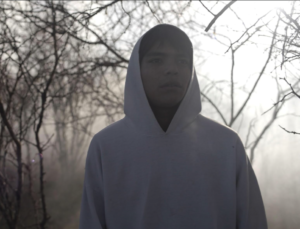
Sujo premiered at the 2024 Sundance Film Festival where it won the World Cinema Dramatic Grand Jury Prize. It is a co-production between Mexico, the United States and France. The film was selected as Mexico’s submission for consideration for Best International Film at the 97th Academy Awards and just picked up major awards at the Morelia Film Festival in Mexico. Sujo will screen again at the Palm Spring International Film Festival again on Tuesday, January 7 at the Festival Theaters 6 at 3:30 pm and Friday, January 10 in the Festival Theatres 3 at 8:00 pm.
An optimistic entry in a traditionally brutal genre, Sujo is a story about defying gravity. Like Sleeping Beauty – who manages to prick her finger, even after all of the spinning wheels in the kingdom were thought destroyed – or tragic figures from Greek mythology whose fates are dictated by the gods, the title character seems doomed to follow in the footsteps of his father, Josue (Juan Jesús Varela Hernández), a sicario killed by the cartel for which he worked.
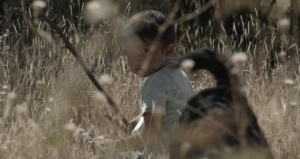
Josué, a sicario for the cartel, is assassinated, leaving his 4-year-old son, Sujo behind. Sujo’s aunts, Nemesia and Rosalía, take him to be raised in a remote mountain shack. Sujo spends his childhood in isolation, with only his aunts and Rosalía’s sons, Jai and Jeremy. As the boys grow older, Sujo and his peers rebel and become involved with the drug violence around them. During a turf war, Jeremy is killed, and Sujo’s aunt Nemesia sends him off to live in Mexico City. The first three chapters of the film take place in Tierra Calientes, south of Guanajuato, where the drug cartels hold sway. The later chapters take place in Mexico City, and the pacing of the film changes significantly.
Suddenly we see Sujo with a job loading onions at the Mercado Central and living a small room in an apartment building. We aren’t presented with proper character development in this new chapter of Sujo’s life. You feel as if some details were missing. Most of his characterization is up to interpretation. One hopes for more in-depth exploration of the main character’s adult life, but it would have made for an even longer film.
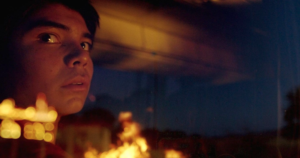
Rondero and Valadez (who collaborated on 2020 Sundance breakout Identifying Features) approach the sensationalistic topic of the Mexican drug wars with an art-house sensibility, stripping away the illicit glamour that accompanies more action-oriented south-of-the-border thrillers, like Miss Bala or Sicario. If anything, it’s more like Richard Linklater’s Boyhood, as the filmmakers check in on Sujo (played by two actors) over the years. First, they introduce his father as a child, still innocent enough to imagine whatever kind of life he wanted for himself. Young Josue marvels at the sight of a wild horse, a gorgeous animal that comes to represent a kind of freedom he will never know, but which Josue’s son may someday achieve, if only the boy can avoid the pitfalls that surround him.
In an unsettling early scene, Sujo (Kevin Uriel Aguilar Luna) sits in the backseat while his father handles his business, which, on this particular occasion, means making someone disappear. Locked in the car, the oblivious boy doesn’t understand what’s happening, but audiences will, which makes this dark variation on a “take your son to work day” uniquely chilling. How can the child possibly forge a path for himself if his own father — his strongest role model and a tender presence at home — normalizes this kind of activity from such an impressionable age?
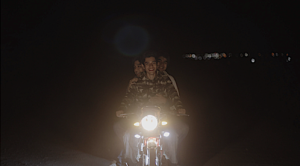
The filmmakers present this memory from Sujo’s perspective: Bored at first, then anxious and uncomprehending when Josue (known as “Ocho,” according to his place in the cartel hierarchy) doesn’t return for hours, he sits in the car for hours until an old man happens to pass by. What if that had been the last time Sujo saw his father?
Rondero and Valadez resist depicting violence outright — which may disappoint those hoping for a more conventional thriller — though it lurks like some kind of bloodthirsty carnivore, licking its jaws just off-screen for most of the picture. Their script provides just enough information to put the pieces together, suggesting what Josue did to seal his own fate (he killed the son of the local cartel boss) as well as the threat that Sujo is destined to wind up “in the same barrel” where they’ve stuffed his dad’s body.
When the local drug lord comes looking for Sujo, DP Ximena Amann (who also plays the part of a neighboring female cousin) puts the child Sujo under the kitchen table. There is no way that Little Sujo can possibly know the stakes of this particular game of hide and seek. Or maybe he does: Sujo wets himself in that moment. Fortunately for the child, Josue’s sorceress-like sister Nemesia (Yadira Pérez Esteban), who lives in a hut outside town without floors or electricity, steps in to raise her orphaned nephew. At the Q&A, director Valadez pointed out that the non-emphasis on the lesbian nature of the relationship of Nemesia and the other women flew under the radar of critics.
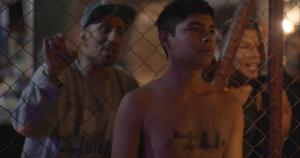
From this point forward, the movie cycles through the key influences in the life of Sujo (played as a young man by Juan Jesús Varela), some of whom — like cousins Jai (Alexis Jassiel Varela) and Jeremy (Jairo Hernandez Ramirez), who joins the cartel — pull him back toward temptation. Others, such as the university literature professor, Susan (Sandra Lorenzano), who sees a different kind of potential in the boy, encourage him to find another path.
Narratively speaking, the story is most exciting when the risks to Sujo are greatest. But the moments that stick with you in the days and weeks afterward are the quiet ones: glimpses into the life of a kid plucked from a macho culture and raised in secret. Deprived of a father figure, Sujo is forced to define his own masculinity and teased when he reaches Mexico City by the tough guys at an outdoor boxing gym.
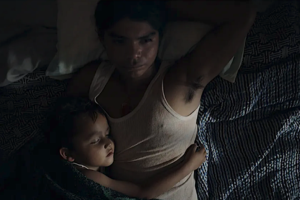
Somehow, Jai manages to track him down, and suddenly, whatever progress Sujo has made toward a new life (which includes enrolling in Professor Susan’s class at the National Autonomous University of Mexico) could be wiped out by the wrong decision. In “Sujo,” it’s not enough to escape the lure of the cartels; someone in his position must consciously move away from that world with every choice. When the explanation of Sujo’s name finally comes, there’s a tragic irony to its significance, and the fact Sujo will never learn what we do about its origins. The father who christened him is gone, but it’s clear from the film’s closing flashback that he wanted his boy to be free.